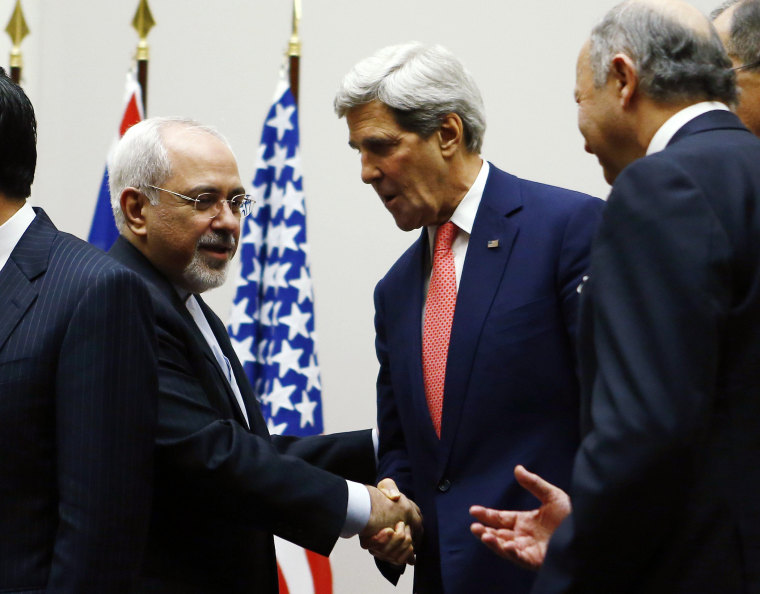Just a couple of months ago, with global tensions rising on U.S. policy towards Syria, the Obama administration scored an unexpected win. Over the course of several days, the Obama administration pushed Syria into the chemical weapons convention, helped create a framework to rid Syria of its stockpiles, successfully pushed Russia into a commitment to help disarm its own ally, quickly won support from the United Nations and our allies, and did all of this without firing a shot.
Republicans and the Beltway pundits were outraged. It was, they assured the public, a "fiasco" that left the president looking "weak." It didn't matter that the United States had advanced its interests through peaceful means; what mattered was the political establishment had been promised missile strikes and seemed bitterly disappointed when the plans were scrapped.
It's hard not to get a sense of deja vu.
Top lawmakers on both side of the aisle on Sunday voiced skepticism about the newly struck agreement with Iran, and vowed to keep up the pressure with sanctions. Senior members in both chambers said that, at first glance, Iran got the better end of the deal with western powers, China and Russia – effectively exchanging looser sanctions for very little progress in impeding Tehran's nuclear capabilities. Some powerful lawmakers have said they're willing to seek new sanctions now, but delay their implementation until after the six months covered by the current deal. But others weren't even willing to go that far.
The outrage from right-wing media personalities -- Breitbart's Ben Shapiro equated the nuclear agreement with Chamberlain at Munich, and he didn't appear to be kidding -- was hardly a surprise, but the complaints weren't limited to extremists. Indeed, it wasn't even limited to conservatives.
Yesterday's commentary offered the public a variety: Republicans who were skeptical of the international breakthrough and Democrats who were skeptical of the international breakthrough. Though Dems weren't willing to go nearly this far, some GOP policymakers raised the prospect of sabotaging U.S. foreign policy on purpose, imposing new sanctions that would scuttle the deal.
Given the reaction, a casual observer might start to think the West struck an awful deal that effectively gave away the store. There's ample evidence to the contrary.
It's true that the agreement is not a permanent, comprehensive solution, but it wasn't intended to be -- it's a six-month deal. During that time, Iran will not only agree to stop enriching uranium beyond 5%, it will also scrap its stockpile that's already been enriched to 20%, while halting work on a heavy-water reactor and allowing an inspections process to begin. In exchange, some sanctions will be temporarily eased, offering Iran a modest economic boost.
Fred Kaplan explained, "The Iranian nuclear deal struck Saturday night is a triumph. It contains nothing that any American, Israeli, or Arab skeptic could reasonably protest. Had George W. Bush negotiated this deal, Republicans would be hailing his diplomatic prowess, and rightly so." (It is, in fact, a deal Bush/Cheney could have negotiated a decade ago, had the Republican administration not been in such a rush to label Iran part of an "axis of evil.")
What's more, let's note that as of last week this agreement enjoyed 2-to-1 support from the American mainstream.
The Beltway complaints are predictable, but unnecessary. Diplomatic solutions need not be reflexively condemned as impractical, and peaceful resolutions need not be criticized as weak. The next steps will certainly be more difficult, and the delicate framework may yet collapse, but for now, this appears to be a deal that advances U.S. interests and puts more distance between Tehran and a nuclear-weapons program.
